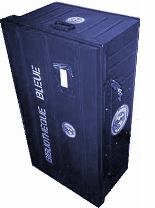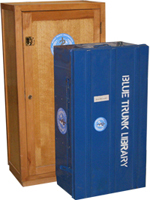Health knowledge initiatives-BTL
Blue Trunk Library
 What is the Blue Trunk Library?
What is the Blue Trunk Library?
The Blue Trunk Library was created for health care professionals working outside of cities and in remote areas who do not have easy access to health information. The Blue Trunk Library was created by WHO, in collaboration with Member States, to not only provide these health professionals with the information they need but also to encourage reading as a source of knowledge and training within the community.
Why do we need a mini library”?
Health science libraries in medical colleges in the Region suffer from a shortage of medical books and journals. Very often the only information resources available are outdated. Outside major cities, the situation is much worse. Health care professionals are unable to access adequate resources, and books are rarely found in health centres and hospitals. Medical libraries which do have information resources often lack the means to disseminate this information.
Contents of the library
The mini library is a collection of about 150 books on medicine and public health, together with three or four subscriptions to health and biomedical journals, for district health centres. The collection, which is organized according to major subjects, has been developed by the WHO Library, in collaboration with the health publications, production and dissemination programme of the Regional Office. For ease of transport and storage, the collection has been packed into a blue metal or natural wood trunk fitted with shelves on which the cardboard boxes containing the books are arranged.
Among the works chosen, priority has been given to practical manuals (especially those published by WHO), offering an easily accessible solution to medical, public health and management problems medical staff may face. The differing levels of education among district medical staff have also been taken into account. The same topic may be addressed in different publications from a different point of view: that of a physician, nurse, nursing auxiliary or health worker. Regional Office publications have been added to the collection. The collection, which has been kept deliberately small, is not exhaustive. Other suitable local material is available at district level and should be added. The list of publications is developed in consultation with the Ministry of Health. The WHO publications in the collection are updated by the provision of new editions.
Cost of the library
 The price of each module is US$ 2000 (approximately). This includes the books and periodicals, transport and delivery. An agreement was reached with WHO Headquarters that they would be responsible for providing the library materials and shipping and the Regional Office responsible for:
The price of each module is US$ 2000 (approximately). This includes the books and periodicals, transport and delivery. An agreement was reached with WHO Headquarters that they would be responsible for providing the library materials and shipping and the Regional Office responsible for:
- anufacturing the mini library either in metal or wood
- arranging the materials in the trunk
- translating manuals and guides
- providing training for staff at district level
- setting up the network of mini library operators.
A procedure for keeping WHO publications up to date has been established. Operational monitoring and evaluation is conducted locally by a national coordinator, with WHO support. Specifications for initial installation of the mini library require that the library is placed in clean premises accessible to all district health staff and is subject to some supervision to ensure that the collection remains as complete as possible.
Training of operators
 The WHO Regional Office health publications, production and dissemination programme, in collaboration with the WHO country representative organizes and conducts training in countries that have received a mini library. Training is an essential element of this project, as it is not merely an operation to distribute books. In the absence of a librarian, the library is handed over to a health professional who acts as a mini library assistant, whose task is to manage and publicize the library in order that the information contained in the collection is disseminated at district level. The training given to these health workers does not qualify them as a librarian but it does turn them into active partners to ensure the transmission of medical and health information.
The WHO Regional Office health publications, production and dissemination programme, in collaboration with the WHO country representative organizes and conducts training in countries that have received a mini library. Training is an essential element of this project, as it is not merely an operation to distribute books. In the absence of a librarian, the library is handed over to a health professional who acts as a mini library assistant, whose task is to manage and publicize the library in order that the information contained in the collection is disseminated at district level. The training given to these health workers does not qualify them as a librarian but it does turn them into active partners to ensure the transmission of medical and health information.
There are two types of training.
The first is given to the project's supervisory team (country office staff, national coordinators and librarians from the Ministry of Health). This team then assists in training mini library assistants. It aims to train trainers and supervisors. The second is for mini library assistants who will operate the service at the district level. The content of the training, based on modules prepared by the WHO, emphasizes the importance of up-to-date medical information in order to provide the community with the best services. They are taught how to retrieve information by using the main subject categories (MeSH), the titles of works, indexes, etc. Emphasis is placed on their role as promoters of the mini library within the district health team.
They are shown how to integrate the project into continuing education and health promotion activities. Lastly, they are taught a number of basic principles of medical librarianship (loan, check-in of journals, conservation). Great importance is attached to evaluating the project using various tools such as loan cards, comments by users and statistics of use with help from the coordinator during their visits. When returning to their districts, mini library assistants can feel confident that they will be supported in their task and are part of a region-wide network.


